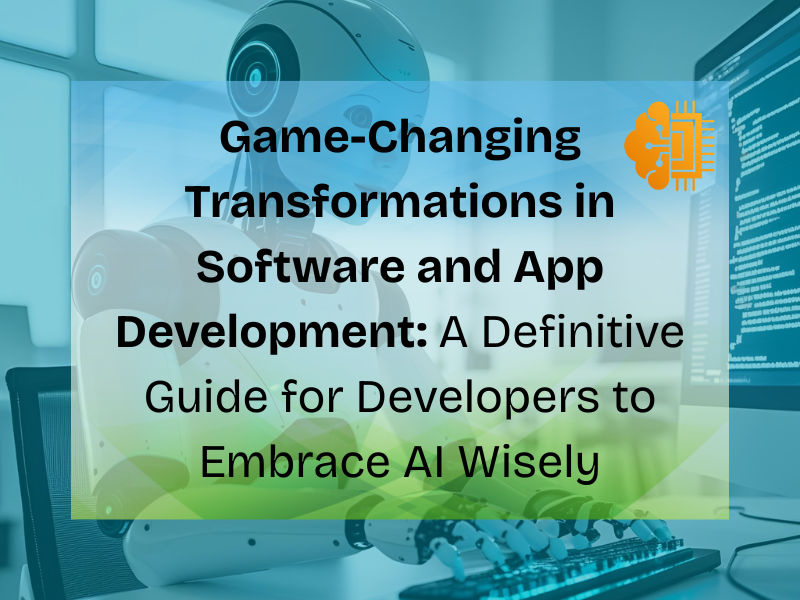Game-Changing Transformations in Software and App Development: A Definitive Guide for Developers to Embrace AI Wisely
The landscape of software and app development is undergoing a seismic shift, propelled by the relentless advance of Artificial Intelligence. Far from being a threat, AI is emerging as the ultimate co-pilot for developers, promising unprecedented levels of productivity, efficiency, and innovation. This isn't a speculative future; it's the proven reality of today, and for developers, understanding and leveraging AI is no longer an option, but a definitive pathway to career growth and mastery.
AI as a Force Multiplier in the SDLC
AI is fundamentally transforming every stage of the Software Development Life Cycle (SDLC)
- Requirements Gathering and Design: AI tools are revolutionizing how we understand user needs. By analyzing vast amounts of user data, feedback, and market trends, AI can provide actionable insights, helping developers translate complex requirements into concrete features. AI-powered design tools can even generate initial wireframes, mock-ups, and prototypes, significantly reducing the time spent on manual design.
- Code Generation and Autocompletion: This is perhaps the most visible impact of AI. Tools like GitHub Copilot, Tabnine, and Amazon CodeWhisperer use large language models (LLMs) to provide real-time, context-aware code suggestions, complete lines, and even generate entire functions or methods based on natural language descriptions. This dramatically speeds up coding, allowing developers to focus on higher-level logic and problem-solving. Developers using AI-generated code report up to 55% faster development cycles and an 88% increase in productivity.
- Debugging and Testing: AI excels at identifying patterns in code and detecting anomalies. AI-powered testing tools automate bug detection, generate comprehensive test cases (even for complex edge cases), and analyze test results. This not only increases test coverage and accuracy but also significantly reduces the time and effort traditionally spent on debugging. AI systems have demonstrated high accuracy in detecting vulnerabilities and inconsistencies that human reviewers might miss.
- Code Review and Refactoring: AI can automate parts of the code review process, suggesting improvements, identifying potential mistakes, and ensuring adherence to coding standards. AI can also assist in refactoring code, making it cleaner, more readable, and maintainable, while also highlighting security implications and vulnerabilities.
- Deployment and DevOps: AI-powered DevOps tools streamline CI/CD pipelines, automate deployment workflows, and monitor system performance in real-time. AI can predict potential issues before they impact production, enabling proactive maintenance and reducing downtime.
Embracing AI for Career Advancement: A Developer's Definitive Guide
Instead of fearing job displacement, developers should view AI as a powerful ally. Here's how to wisely integrate AI into your career development:
- Become Proficient with AI Coding Assistants: These are your new daily drivers. Master tools like GitHub Copilot, Cursor, Tabnine, and Amazon CodeWhisperer. Understand their capabilities, limitations, and how to effectively prompt them to generate the best code. This is about learning how to work with AI, not how to be replaced by AI.
- Focus on Higher-Order Thinking: As AI handles routine and boilerplate coding, your value shifts to architectural design, complex problem-solving, system integration, user experience (UX) design, and understanding business logic. Cultivate these skills, as they are less susceptible to automation and demand human creativity and judgment.
- Learn Prompt Engineering: The ability to craft effective prompts for AI models is a crucial skill. Learning how to articulate your needs clearly and precisely to AI assistants will unlock their full potential and significantly boost your productivity.
- Understand AI's Limitations and Ethical Considerations: While powerful, AI can generate biased or inaccurate code, or introduce security vulnerabilities. Develop a critical eye, always verify AI-generated output, and understand the ethical implications of using AI in development. Responsible AI usage is paramount.
- Deepen Your Knowledge of Core Principles: AI is built on fundamental computer science principles. A strong grasp of data structures, algorithms, system design, and software architecture will enable you to guide AI effectively and troubleshoot complex issues it might miss.
- Specialize in AI-Related Development: The demand for AI engineers, machine learning specialists, and AI integration experts is skyrocketing. Consider upskilling in areas like machine learning, deep learning, natural language processing, and AI model deployment. Many online courses and certifications are available, such as the IBM AI Developer Professional Certificate.
- Leverage AI for Your Own Career Growth: Use AI tools for resume building (e.g., Resume.io), interview preparation (e.g., Google Interview Warmup), and identifying career paths (AI-powered job portals like LinkedIn and Indeed).
The advent of AI in software and app development marks an exciting new era. By embracing AI, understanding its power, and focusing on skills that complement its capabilities, developers can not only secure their careers but also unlock unprecedented opportunities for innovation and impact. The future belongs to those who learn to harness AI wisely.

